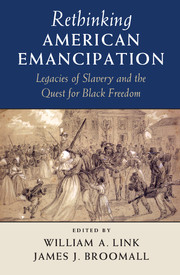Book contents
- Frontmatter
- Contents
- List of figures
- Notes on the Editors and Contributors
- Acknowledgments
- Introduction
- I CLAIMING EMANCIPATION
- II CONTESTING EMANCIPATION
- III REMEMBERING EMANCIPATION
- 7 African Americans and the Long Emancipation in New South Atlanta
- 8 Washington, Toussaint, and Bolivar, “The Glorious Advocates of Liberty”: Black Internationalism and Reimagining Emancipation
- 9 Remembering the Abolitionists and the Meanings of Freedom
- Epilogue: Emancipation and the Nation
- Index
9 - Remembering the Abolitionists and the Meanings of Freedom
from III - REMEMBERING EMANCIPATION
Published online by Cambridge University Press: 05 November 2015
- Frontmatter
- Contents
- List of figures
- Notes on the Editors and Contributors
- Acknowledgments
- Introduction
- I CLAIMING EMANCIPATION
- II CONTESTING EMANCIPATION
- III REMEMBERING EMANCIPATION
- 7 African Americans and the Long Emancipation in New South Atlanta
- 8 Washington, Toussaint, and Bolivar, “The Glorious Advocates of Liberty”: Black Internationalism and Reimagining Emancipation
- 9 Remembering the Abolitionists and the Meanings of Freedom
- Epilogue: Emancipation and the Nation
- Index
Summary
On April 14, 1865, William Lloyd Garrison and other leading abolitionists visited Charleston, South Carolina, to celebrate the end of the war and of slavery. It was their first visit to Charleston, and several noted with irony that thirty years earlier in Boston, Garrison had been dragged through the streets and almost lynched, whereas in the cradle of the Confederacy he was greeted with cheers. Following a Union flag-raising at Fort Sumter, Garrison gave a short speech at the Charleston Hotel, emphasizing the inseparability of abolition and emancipation. Referring to his recent meeting with Lincoln, Garrison said: “of one thing I feel sure, either he has become a Garrisonian Abolitionist or I have become a Lincoln Emancipationist, for I know that we blend together, like kindred drops, into one.”
Garrison's statement wonderfully encapsulates the social revolution that accompanied the war, and the role that abolitionists played in it. Everyone understood Garrison's terms. “Abolitionists” were black and white radicals who sought an immediate end to slavery and racial equality in theory. “Emancipationists,” or “anti-slavery advocates,” were liberals who sought to preserve the Union. Constituting the rank and file of the Republican Party, they, too, defined slavery as evil. But for emancipationists, the evil of slavery stemmed less from what it did to slaves than from what it did to the Union. They advocated practical, legal, and preferably gradual solutions to slavery. And, unlike the abolitionists, they opposed racial equality and were captivated by the idea of colonizing blacks in another country.
But the exigencies of war had transformed Lincoln and other emancipationists into abolitionists, while Garrison and other abolitionists had become emancipationists. Preserving the Union required abolishing slavery, and vice-versa. The categories of radical versus liberal, immediatist versus gradualist, idealist versus realist, had broken down.
With the war, black and white abolitionists were transformed from a tiny group of despised fanatics into respected prophets. They were considered indispensable to the war effort and the successes of Reconstruction, which brought almost unprecedented humanitarian achievements. These included the constitutional amendments that ended chattel slavery and guaranteed citizenship, equal protection under the law, and unrestricted male suffrage to blacks; the desegregation of federal post offices, courts, public transportation, and visitors' galleries in Congress; and the extraordinary rise of black literacy and black office-holders at local, state, and national levels.
- Type
- Chapter
- Information
- Rethinking American EmancipationLegacies of Slavery and the Quest for Black Freedom, pp. 216 - 251Publisher: Cambridge University PressPrint publication year: 2015



